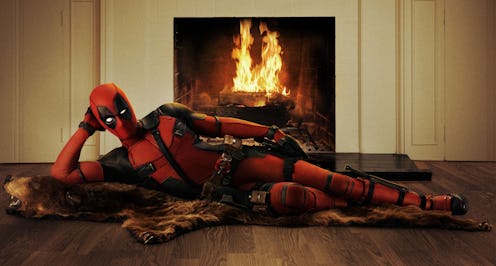
In the months leading up to the release of Deadpool, fans were promised many things. Deadpool was going to usher in a new era of superhero films; it was going to give fans a "different" kind of hero; it'd provide a unique kind of girlfriend character; in short, it was supposed to be like nothing we had ever seen before. The hype, as they say, was real. And most of it was due to the clever marketing for Deadpool, which, much like the film itself, was over-saturated with a self-deprecating tone and a gleeful desire to shock viewers used to a more wholesome hero (think Captain American and Superman). But is Deadpool really going to change superhero movies? Personally, I doubt it.
One word has been repeated over and over again to describe Deadpool in the media is "subversive." While promoting Deadpool, star Ryan Reynolds described the movie to GQ by calling it "subversive and a little bit different." This desire to shake up the Hollywood superhero movie formula is commendable. After all, in a world that has about a half a dozen superhero films released every year, it's hard to think of a movie that could bring anything new to the table. A superhero like Deadpool, who doesn't want to be anybody's hero, breaks the forth wall, and swears like a 14-year-old boy, is undeniably unique and different. But having some subversive elements isn't the same as re-writing an entire genre of film. And Deadpool isn't nearly as smart as it wants us to think it is.
The biggest thing that separates Deadpool from other mainstream superheroes is his detest and rejection of the label. He makes it very clear that he isn't interested in using his powers and skills to save anybody. He has one mission and one mission only: revenge. His reasons for going after the villainous Ajax are purely personal. He's not interested in taking down whatever organization Ajax works for, he just wants this one man to pay for torturing him and disfiguring him. However, it's worth noting that in the final battle, Deadpool isn't fighting for revenge, he's fighting to save the love of his life, Vanessa (who, incidentally, is no game-changing girlfriend character, either).
Whether he is willing to acknowledge it or not, the biggest fight in the movie, the climactic action piece, consists of Deadpool using his powers to save the life of an innocent. So, tell me, how does that differ greatly from any other superhero we've seen? The intention might be different (though, be honest, how many times have we seen the reluctant hero trope before?), but the product is still the same. Deadpool is just like any other superhero, but with less moral conflicts and way more violence and swearing.
It's not that I didn't enjoy Deadpool — I did. It's an entertaining film that succeeds in launching a new franchise and in making meta, self-referential jokes that are, for the most part, pretty damn amusing. But I don't think it's going to change the way superhero movies are made. And I don't think it really wants to. Yes, Deadpool joking about having to do sexual favors for Hugh Jackman, of Wolverine fame, to get this movie made at the top of the film is funny and different. But the jokes don't necessarily reject the superhero formula. At the end of the day, talk is just talk.
Take Vanessa, Deadpool's love interest played by Morena Baccarin. Baccarin is first presented as " a hot chick" during the film's funny opening credits, which gave me hope that she would be, well, more than just another hot chick. She's not, at least not in any way that we haven't seen before. Commendable though her character is for being (mostly) well formed and dimensional, she's not stronger or more fully formed than other superhero girlfriends (think Agent Carter from Captain America: The First Avenger). Calling out a trope is not the same thing as subverting it. Though it didn't make the final cut, Vanessa also had a line about not playing the role of the damsel in distress (as seen in the trailers). And yet that is exactly what she became.
So, Deadpool might not be a game changer in terms of the superhero formula. What it could change is how much violence, blood, and sex will be accepted in superhero movies going forward. Unlike, say, the Avengers, who work tirelessly to minimize casualties, Deadpool couldn't give less of a f*ck. He likes his guns, and he'll kill anyone that gets in his way. He also has a dirty mouth and mind, all courtesy of the film's snazzy R-rating. The only thing that might change as a result of Deadpool's success is more R-rated superhero movies. (Fingers crossed, Captain America can trade in that V-card!)
Deadpool is changing some aspects of superhero movies. But it won't change everything. It's not even trying.
Images: 20th Century Fox; Giphy (3)